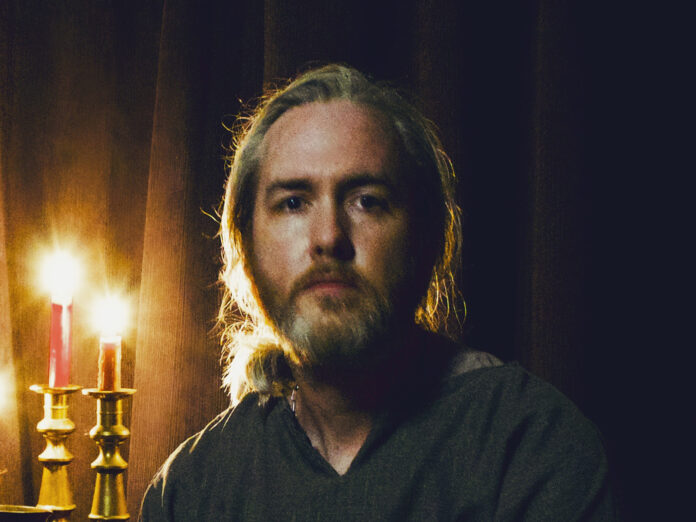Take a look at the cover of Albion and you’ll see a bearded, robed traveller – Harp’s Tim Smith – on a bleak, snow-dappled moor, guitar held at his waist in place of a sword, an ill-advised and dangerous quest no doubt weighing heavy on his mind. It’s a brilliant, and silly, image, and yet it says something about the long journey Smith has been on since he left Midlake, the band he fronted and ostensibly led, back in 2012.
Take a look at the cover of Albion and you’ll see a bearded, robed traveller – Harp’s Tim Smith – on a bleak, snow-dappled moor, guitar held at his waist in place of a sword, an ill-advised and dangerous quest no doubt weighing heavy on his mind. It’s a brilliant, and silly, image, and yet it says something about the long journey Smith has been on since he left Midlake, the band he fronted and ostensibly led, back in 2012.
KEITH RICHARDS IS ON THE COVER OF THE NEW UNCUT – HAVE A COPY SENT STRAIGHT TO YOUR HOME
The Texans had been trying and failing to make the follow-up to 2010’s The Courage Of Others when Smith departed, fed up of it all. While 2006’s stellar The Trials Of Van Occupanther had been a record that predicted much of what was to come in indie-rock over the following few years – Fleet Foxes, Bon Iver and more – The Courage Of Others was a puzzling sequel, with some fans and critics bemused by the austere pace and super-serious English folk within.
Attempts to write and record his first album as Harp became an epic struggle, however; a decade-long quest, during which Smith met and married Kathi Zung, now an integral part of the project, especially in its production, and moved to North Carolina. Like most foolhardy crusaders, Smith continued doggedly on, seemingly working out how he could make the courtly folk of The Courage Of Others even more dour: the answer, he discovered, was in the influence of ’80s goth, especially The Cure’s masterpiece of misery, Faith.
Yet, like some hooded alchemist of yore, Smith has skirted disaster and finally transformed these elements into a glittering bounty. His preoccupation with an olde-worlde Britain may be alarming to some – that title, that cover, the medieval dress-up in the “I Am A Seed” video, lyrical nods to William Blake and a few “thee”s and “thou”s here and there – but they are pursued so avidly one can’t help but engage with it all on Smith’s own terms. The result is as if early-’80s Robert Smith suddenly discovered his parents’ Fairport records; not an entirely fanciful idea, considering the threads of misery and detachment within both new wave and the darkest traditional folk.
Short instrumental “The Pleasant Grey” begins the record, its title and funereal synth tones echoing Faith’s “All Cats Are Grey”. This, it seems to promise, is not an upbeat record. “Throne Of Amber” is also very Cure-esque, but its light-footed beat is the fastest on the album: elsewhere, tempos are generally glacial, with the stately, romantic “A Fountain” waltzing over picked, chorused guitar. The guitars move woozily on Albion, effected in a very early ’80s manner – you’d bet a Roland Jazz Chorus amp was utilised at some point. The intro to “I Am A Seed” wows and flutters so far out of key that it’s unsettling, while on the other hand beautifully crystalline, circular arpeggios power “Silver Wings” and clouds of reverb submerge “Country Cathedral Drive”.
It’s a beautifully produced record, with Zung and Smith’s percussion – mostly drum machines – providing a gorgeous, gentle bed for the spirals of guitar, synths and the occasional woodwind. Hovering above all that are Smith’s vocals: clean, yearning and poised, often multi-tracked and sometimes even harmonising in close liturgical fashion.
Lyrically, Albion leans on Smith’s passion for Britain and history, but he avoids any possible prog missteps by imbuing his songs with heartfelt emotions. Many appear to be hymns of deep devotion to his wife, of thankfulness that they met: “Where are you, where are you, my dear?” he sings on “Seven Long Suns”. “How long until you’re here?” Indeed, his lover is celebrated as a “splendid fawn, brighter than every sea and all the mountains” on “Shining Spires”, while on a number of songs the Blakean “daughters of Albion” are evoked as another muse.
Amid the gloam, the closing Cocteaus-esque “Herstmonceux” – named after an East Sussex castle, naturally – acts as the triumphant final scene of Smith’s noble pilgrimage. Over ambient synth pads, strummed acoustic and an ethereal yet anthemic keyboard line, he finds some kind of peace: “Quietly the sorrow flees from me/Bright as day the soul no longer grieves.” This particular quest, then – the search for a redemptive new record, the equal to Smith’s previous peaks – has a joyful ending after all. We can only hope this knight errant’s next journey won’t be so arduous.



